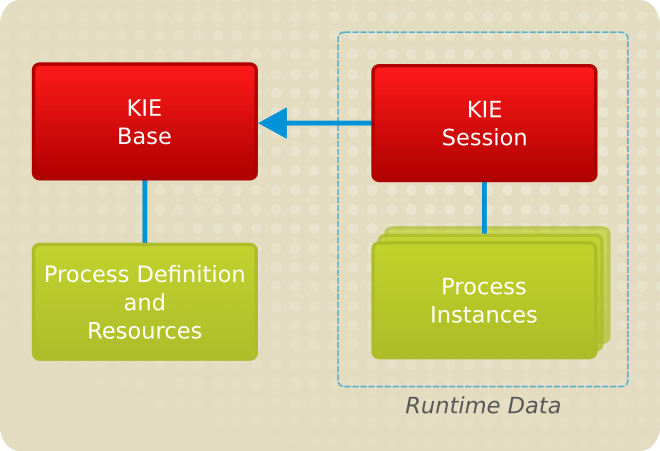このコンテンツは選択した言語では利用できません。
Chapter 2. Basic concepts
Red Hat JBoss BPM Suite provides tools for creating, editing, running, and runtime management of BPMN process models. The models are defined using the BPMN2 language, either directly in its XML form or using visual BPMN Elements that represent the Process workflow (see Chapter 4, Process Designer). Alternatively, you can create Processes from your Java application using the JBoss BPM Suite API. Some of these capabilities can be used also via REST API (See Red Hat JBoss BPM Suite Developer Guide).
Process models serve as templates for Process instances. To separate the static Process models from their dynamic runtime versions (Process instances), they live in two different entities: Process models live in a Kie Base (or Knowledge Base) and their data cannot be changed by the Process Engine; Process instances live in a Kie Session(or Knowledge Session) which exists in the Process Engine and contains the runtime data, which are changed during runtime by the Process Engine.
You can define a Kie Base and its Kie Session in the Project Editor of the GUI application (see Section 3.6, “Defining KIE Bases and Sessions”).
Note that a single Kie Base can be shared across multiple Kie Sessions. When instantiating a Kie Base using the respective API call it is usual to create one Kie Base at the start of your application as creating a Kie Base can be rather heavy-weight as it involves parsing and compiling the process definitions. From the Kie Base, you can then start multiple Kie Sessions. The underlying Kie Bases can be changed at runtime so you can add, remove, or migrate process definitions.
To have multiple independent processing units, it might be convenient to create multiple Kie Sessions on the particular Kie Base (for example, if you want all process instances from one customer to be independent from process instances for another customer; multiple Sessions might be useful for scalability reasons as well).
A Kie Session can be either stateful or stateless. Stateful sessions are long-living sessions with explicit call to dispose them; if the dispose() call is not issued, the session remains alive and causes memory leaks. Also note that the FireAllRules command is not automatically called at the end of a stateful session.
Figure 2.1. Kie Base and Kie Session relationship
